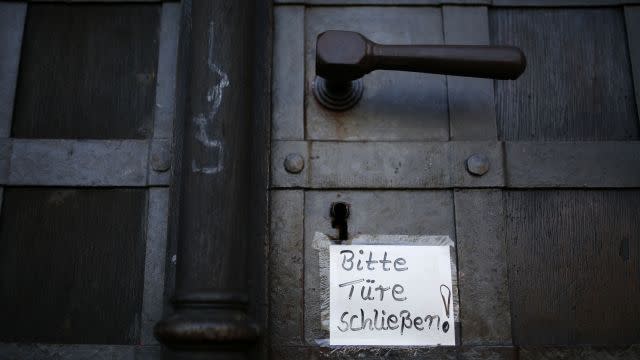To young people in the UK, Brexit is a door closing—and a sign that hate is winning

London
The sense of loss that greets Britain’s younger generations as they wake up today (June 24) has little to do with a yearning for the status quo. That doesn’t inspire this kind of grief.
What we are mourning is our connection, in both the logistical sense and a conceptual one, to Europe, and everything this represented for our future. It was a doorway that we never expected to be shut to us.
And perhaps even more, we’re now afraid. We believed that, even while hate seemed to be growing, connection was stronger. Fear and self-interest weren’t the only drivers of the “leave” campaign, but they proved stronger than their opposite: hope, generosity.
We thought that notions of the UK as a strong little island with tough borders and tight “control” of its sovereignty was the stuff of the past—of a time before we became connected to the rest of the world through global channels of communication, travel, work, study, and friendship.
But the door, almost impossibly, is shutting.
Polling data shows that 64% of 18- to 24-year-olds wanted to remain, the most decisive group in either camp. To the young, staying was a clear choice and—for many—not one that caused conflict. We have grown up in the EU; Britain has been a member for 43 years.
Our own seemingly inevitable membership in the European community promised us freedom. In practical terms, this included the freedom to move between cities and countries, working and learning.
But the freedom was also symbolic. Some of us were children when the Berlin Wall fell in 1989, and when the post-Communist countries in Eastern Europe began to emerge from long years of isolation to join the rest of Europe. By the time we were born, the UK already had become a country in which people with widely diverse heritages coexisted, for the most part in peace.
As the debate about withdrawing from the EU began to rage and to get ugly, we thought harder about this union that we’d rarely questioned—rarely questioned not because of apathy, but because we understood its historic roots, and believed in its mission.
The choice that the UK has now made feels to us like one born not of love of our country, but fear of others. Not of sound, wise, forward-looking judgement—the kind, though it’s idealistic, we might expect from our parents and grandparents, or from our leaders—but of insularity and an instinct to clutch at and gather wealth. The older generations in Britain have done that well—it’s very hard for young people in the UK to think of owning a home, for example, while for those who made their money and bought up property when it was cheap, it’s not uncommon to own several.
Just one more example in which Britain's youngest generations have been shafted by their parents. (v @garymoody65) pic.twitter.com/XuyZUsEclM
— Paul Lewis (@PaulLewis) June 24, 2016
We voted in overwhelming numbers to remain, because the EU became important proof that, even if hatred seems to be on the rise, the similarities between us are stronger.
We aren’t blind to the problems Britain is facing: services that are overstretched; people who fear for their ability to carve out happy lives for themselves and their families. But we haven’t blamed those problems on the EU. It seemed—it still seems—like a scapegoat for mismanagement by a succession of poor national governments.
The young marched in their millions against going to war in Iraq in 2003. They have continued to protest: at cuts to education budgets, and most recently in support of junior doctors. They turned up at the polls in large numbers on June 23.
The UK’s young want change. But they didn’t want this.
The past just voted against the future.
— Adrian Monck (@amonck) June 24, 2016

Sign up for the Quartz Daily Brief, our free daily newsletter with the world’s most important and interesting news.
More stories from Quartz:

 Yahoo Finance
Yahoo Finance 